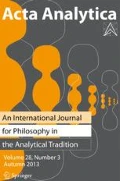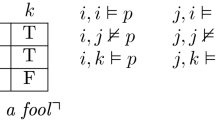Abstract
Two-dimensional semantics aims to eliminate the puzzle of necessary a posteriori and contingent a priori truths. Recently many argue that even assuming two-dimensional semantics we are left with the puzzle of necessary and a posteriori propositions. Stephen Yablo (Pacific Philosophical Quarterly, 81, 98–122, 2000) and Penelope Mackie (Analysis, 62(3), 225–236, 2002) argue that a plausible sense of “knowing which” lets us know the object of such a proposition, and yet its necessity is “hidden” and thus a posteriori. This paper answers this objection; I argue that given two-dimensional semantics you cannot know a necessary proposition without knowing that it is true.
Similar content being viewed by others
Notes
The bearers of the properties of necessity/contingency and a priority/a posteriority are primarily propositions, and only derivatively – the sentences that express them.
The use of “water” there is similar to our use of “Jade,” though much more heterogeneous.
The puzzle threatens anyone who rejects the cognitive requirement. If knowing which thing water is affects one's cognitive standing, as follows from the cognitive requirement, then Sally does not know the C-proposition by reflection alone. To know her own thoughts, she needs to grasp their content, and to do that she must reflect on her environment. This does not mean that Sally needs a basis for her knowledge of her thoughts; but it does mean that the very idea of grasping an externalist thought depends also on reflection on the world.
References
Baldwin, T. (2001). On considering a possible world as actual. Proceedings of the Aristotelian Society Suppl., 75, 157–174.
Brewer, B. (2000). Externalism and a priori knowledge of empirical facts. In P. Boghossian, & C. Peacocke (Eds.) New essays on the a priori. Oxford: Oxford University Press.
Brown, J. (2004). Anti-individualism and knowledge. Cambridge, Massachusetts: MIT Press.
Chalmers, D. (1996). The conscious mind. Oxford: Oxford University Press.
Chalmers, D. (2002). On sense and intension. Philosophical Perspectives, 16.
Davies, M. (2000). Externalism and a priori knowledge. In P. Boghossian, & C. Peacocke (Eds.) New essays on the a priori. Oxford: Oxford University Press.
Davies, M., & Humberstone, L. (1980). Two notions of necessity. Philosophical Studies, 38, 1–30.
Evans, G. (1982). The varieties of reference. Oxford: Oxford University Press.
Jackson, F. (1998). From metaphysics to ethics. Oxford: Clarendon.
Kaplan, D. (1989). Demonstratives. In J. Almog, J. Perry, & H. Wettstein (Eds.), Themes for Kaplan. Oxford University Press, 1989.
Kripke, S. (1980). Naming and necessity. Oxford: Blackwell.
Mackie, P. (2002). Deep contingency and necessary a posteriori truth. Analysis, 62(3), 225–236.
McDowell, J. (1984). De re senses. In Meaning, knowledge, and reality. Cambridge: Harvard University Press.
Pryor, J. (2007). Externalism about content and McKinsey-style reasoning. In S. Goldberg (Ed.) Internalism and externalism in semantics and epistemology. Oxford: Oxford University Press.
Putnam, H. (1975). The meaning of “meaning.”. In H. Putnam (Ed.) Mind, language and reality: Philosophical papers (vol. II (pp. 215–271). Cambridge: Cambridge University Press.
Stalnaker, R. (1984). Inquiry. Cambridge: MIT Press.
Stalnaker, R. (2001). On considering a possible world as actual. Proceedings of the Aristotelian Society Suppl., 75, 141–156.
Tichy, P. (1983). Kripke on necessity a posteriori. Philosophical Studies, 43, 225–241.
Yablo, S. (1999). Self-knowledge and semantic luck: What the externalist can know a priori. In Philosophical Issues, 9, 219–229.
Yablo, S. (2000). Textbook Kripkeanism and the open texture of concepts. Pacific Philosophical Quarterly, 814, 98–122.
Wiggins, D. (2001). Sameness and substance. Cambridge: Cambridge University Press.
Author information
Authors and Affiliations
Corresponding author
Rights and permissions
About this article
Cite this article
Benbaji, H. Two-dimensionalism and the “Knowing Which” Requirement. Acta Anal 23, 55–67 (2008). https://doi.org/10.1007/s12136-008-0022-4
Received:
Revised:
Accepted:
Published:
Issue Date:
DOI: https://doi.org/10.1007/s12136-008-0022-4




